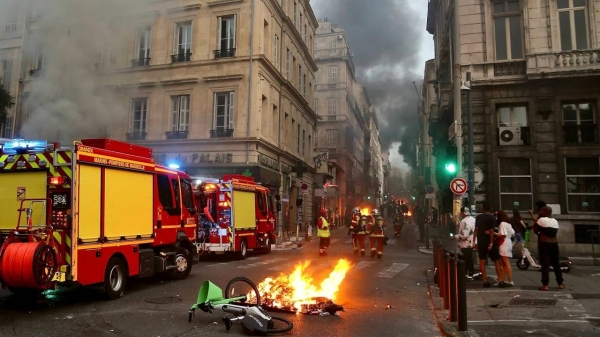
Sudanese President Omar al-Bashir reshuffled his senior military staff on Tuesday as anti-regime protesters defied his new ban on gatherings and rallies.
Several members of Sudan’s eight-strong military staff council switched positions and General Essam al-Din Mubarak, the former deputy head of the council, was given a new position as minister of state in the defense ministry.
“These are normal, routine changes that happen from time to time,” the military spokesman said.
Bashir announced a nationwide state of emergency on Friday and issued a raft of edicts on Monday banning unlicensed public gatherings and awarding sweeping new powers to police.
Security forces were given the power to search any building, restrict movement of people and public transport, arrest individuals suspected of a crime related to the state of emergency and seize assets or property during investigations.
The public prosecutor on Tuesday said that emergency prosecutorial bodies would be set up across Sudan to investigate any crimes taking place under the new status.
On Friday Bashir sacked the governors of Sudan’s regions and replaced them with officials from the military and security services.
The moves have not deterred the protesters with hundreds rallying across the country to call for Bashir’s resignation.
Tuesdays rallies were called by the Sudanese Professional Association, an umbrella of independent professional unions that has spearheaded two-and-a-half months of protests.
Video footage shows demonstrators, mostly women, marching in the streets of Khartoums twin city of Omdurman. Demonstrations were also reported in the city of Atbara and the countrys troubled Darfur region.
Activists said Tuesday that authorities lifted a block on popular social media platforms that have been used to organize and broadcast the protests.
They said users of the three main telecommunications operators in the country - Zain, MTN and Sudani - now have access to Facebook, Twitter and WhatsApp after nearly two months of restrictions during which users could only access the internet through a virtual private network, or VPN.
Meanwhile, the US, Britain, Norway and Canada voiced their “deep” concerns over Bashir’s decisions to declare the state of emergency, impose a ban on unauthorized public gatherings and appoint military and security members to senior government positions.
"The return to military rule does not create a conducive environment for a renewed political dialogue or credible elections," they said in a joint statement.
Protesters have staged almost daily demonstrations since December, demanding that Bashir, who came to power in a 1989 military coup, step down. The protests were initially inspired by high prices for bread but have turned into a sustained campaign against Bashir and his government.












